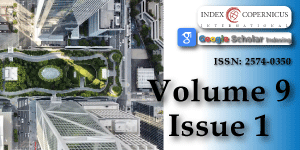Leveraging Green Building Technologies to Understand Sustainability in Bengaluru city
Main Article Content
Abstract
Background: The motivation of this paper is to analyze the growing air pollution level in the city of Bengaluru, as it was once a green city but is now facing problems with the use of private vehicles, such as increasing levels of air pollutants. Green buildings focus on reducing their negative environmental impacts by using less energy and water, and causing less disruption to the environment during construction. Green buildings, which also strive to enhance human health through the design of healthy indoor spaces, are arguably less well-known.
Objective: The main objective is to analyze the most suitable zone in Bangalore for the construction of green buildings. The review of existing green building technologies with the use of natural materials, renewable energy, water conservation, and indoor air quality.
Method: The methodology will include a study of six green building literature reviews with eminent researchers and scientists. The main principles of green building include having indoor air quality of Nitrogen oxides, volatile organic compounds, and particulate matter are the most common air impurities released into the atmosphere by the variability of natural processes and human actions. The advantages of lessened energy and water use are well known, but the potential advantages of green buildings for human health have only lately come into focus. In addition, case study review for Electronic City, Whitefield, and International Airport in Bangalore
Results: To address the comparative study of case study review, Bangalore city data was collected regarding the pollutant levels, then linear regression models were created and reviewed to design green buildings in the future.
Conclusion: The goal of the study is to comprehend how toxins, a rise in urban population density, the usage of novel artificial resources, and traffic contamination all work together to worsen indoor air quality and increase harmful impacts on people.
Article Details
Copyright (c) 2025 Gupta J, et al.

This work is licensed under a Creative Commons Attribution 4.0 International License.
Wei W, Ramalho O, Mandin C. Indoor air quality requirements in green building certifications. Building and Environment. 2015;92:10-9. Available from: https://doi.org/10.1016/j.buildenv.2015.03.035
Steinemann A, Wargocki P, Rismanchi B. Ten questions concerning green buildings and indoor air quality. Building and Environment. 2017;112:351-8. Available from: https://doi.org/10.1016/j.buildenv.2016.11.010
Akadiri PO, Chinyio EA, Olomolaiye PO. Design of a sustainable building: A conceptual framework for implementing sustainability in the building sector. Buildings. 2012;2(2):126-52. Available from: https://doi.org/10.3390/buildings2020126
Choi HS, Song SK. Directions for a Transition toward Smart Sustainable Cities based on the Diagnosis of Smart City Plans. Smart Cities. 2022;6(1):156-78. Available from: https://doi.org/10.3390/smartcities6010009
Razmjoo A, Nezhad MM, Kaigutha LG, Marzband M, Mirjalili S, Pazhoohesh M, Piras G. Investigating smart city development based on green buildings, electric vehicles, and feasible indicators. Sustainability. 2021;13(14):7808. Available from: https://doi.org/10.3390/su13147808
Battista G, Evangelisti L, Guattari C, Basilicata C, de Lieto Vollaro R. Building energy efficiency: Interventions analysis under a smart cities approach. Sustainability. 2014;6(8):4694-705. Available from: https://doi.org/10.3390/su6084694
Liu Z, Chi Z, Osmani M, Demian P. Blockchain and building information management (BIM) for sustainable building development within the context of smart cities. Sustainability. 2021;13(4):2090. Available from: https://doi.org/10.3390/su13042090
Martins F, Patrão C, Moura P, de Almeida AT. A Review of Energy Modeling Tools for Energy Efficiency in Smart Cities. Smart Cities. 2021;4(4):1420-36. Available from: https://doi.org/10.3390/smartcities4040075
Gupta J. Statistical assessment of spatial autocorrelation on air quality in Bengaluru, India. In: International Conference on Intelligent Vision and Computing. Cham: Springer Nature Switzerland; 2022. p. 254–65. Available from: https://link.springer.com/chapter/10.1007/978-3-031-31164-2_21
Sao A, Gupta J. Sustainability indicators and ten smart cities review. In: 2023 IEEE International Conference on Contemporary Computing and Communications (InC4). IEEE; 2023. p. 1–6. Available from: https://doi.org/10.1109/InC457730.2023.10263236
Gupta J, Kumar R. Urban Growth Modelling Based on CA-Markov Approach on Bengaluru India. Assessment. 2001;91(21):21. Available from: https://www.researchgate.net/profile/Jyothi-Gupta-5/publication/381181501_Urban_Growth_Modelling_Based_on_CA-Markov_Approach_on_Bengaluru_India/links/66616c2ea54c5f0b944ec8ed/Urban-Growth-Modelling-Based-on-CA-Markov-Approach-on-Bengaluru-India.pdf
Kunnath ARE, Gupta J. A Review of biophilic design at Kuttikattoor school for the children. E3S Web Conf. 2024;546:01002. Available from: https://doi.org/10.1051/e3sconf/202454601002
Gupta J, Kumar R. A Review of Geospatial Urban Growth Modelling with Applications. In: Sustainability and Urban Quality of Life. Taylor & Francis; 2025. p. 299–313. Available from: http://dx.doi.org/10.4324/9781003604358-19
Gupta J, Kumar R. Evaluating the sustainable indicators of cities of India: ESG framework review. Geo Eco. 2025;3(143). Available from: http://dx.doi.org/10.62476/ge.3.143
Chatterjee U, Bhunia A, Gupta J, Gupta K, editors. Sustainability and Urban Quality of Life: Research, Policy and Practice. Taylor & Francis; 2025. Available from: https://www.taylorfrancis.com/books/edit/10.4324/9781003604358/sustainability-urban-quality-life-uday-chatterjee-avishek-bhunia-jyothi-gupta-krishnendu-gupta

